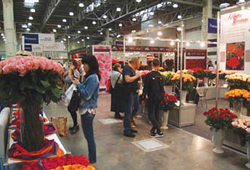
By Mary Mwende Mbithi
With the industry just recuperating from the ravages of covid-19 pandemic, another setback has just hit the global flower industry. The war in Ukraine is threatening further disruption to an already overstretched global supply chain. The two countries may not only account for a small proportion of the imports of major growing nations but also account for a great percentage of supply of agricultural input such as fertilizers
Fertilizer is majorly produced in both Ukraine and Russia. More disruptions are likely to set in and further strain an already struggling sector, where the cost of production has been greatly high due to existing cost of fertilizers in Kenya. This will in turn decrease the growers’ profit margins.
The international Women’s Day is just around the corner and the flower industry is overly filled with high expectations to cash in on this remarkable day created in the 1920s. Women’s Day originally was an opportunity to praise Soviet women and their role in the state.
The national holiday is not only a celebration of Russian women but also big business for suppliers and sellers of flowers. Last year, Russia imported thousands of tons of flowers in all shades and colours ahead of the holiday, according to the country’s customs office. The top four countries of origin of the flowers were the Netherlands, Ecuador, Kenya and Columbia.
However, the flower industry is uncertain about the export of flowers to the conflict zones bearing in mind that the flower market spans across Russia, Ukraine and the neighbouring countries like Latvia, Belarus, Estonia and Lithuania.
The suspension of air traffic in both Ukraine and Russia simply means no exportation of flowers to markets in both countries. Though most flowers for this specific day had already been sent before, the issue of payment is also of concern to flower growers with the exclusion of Russian banks from the swift payment network.
Adverse economic effects of the war have also seen the stocks tumble in recent days mounting pressure on inflation already squeezing the stumbling global economy.
In Kenya, a number of growers export to Russia with one grower almost exclusive. Speaking to Floriculture Magazine, growers confirmed this will not only affect the already exported but also all year round market. The Russian market is famous for the large stem and big headed premium roses which may force those growing in high altitude to sell them at throw away prices in the other markets.
Again, if most Kenyan flowers miss their target markets in Russia and Ukraine they will eventually end up in the EU market which is also a flower destination for Kenyan grown flowers thus causing a market saturation which in turn causes decrease in prices hence losses to the growers.
Effects of Russia and Ukraine conflict will be greatly felt by suppliers and supermarkets across Europe in the coming weeks. On the other hand, Russia and Ukraine supermarkets as well as retailers that supply flowers to the end consumer have also been affected as fears of a protracted armed conflict escalate. This means that the bouquets will not reach the end consumer.
If this conflict persists, effects will be felt on the entire supply chain because there will be need to optimize their results through adjusting the purchasing price from their suppliers who are feeling the heat due to high costs of production and transportation resulting from soaring energy and fuel prices.
Consequently, growers are calling for an amicable solution to enable them continue with business as usual.
